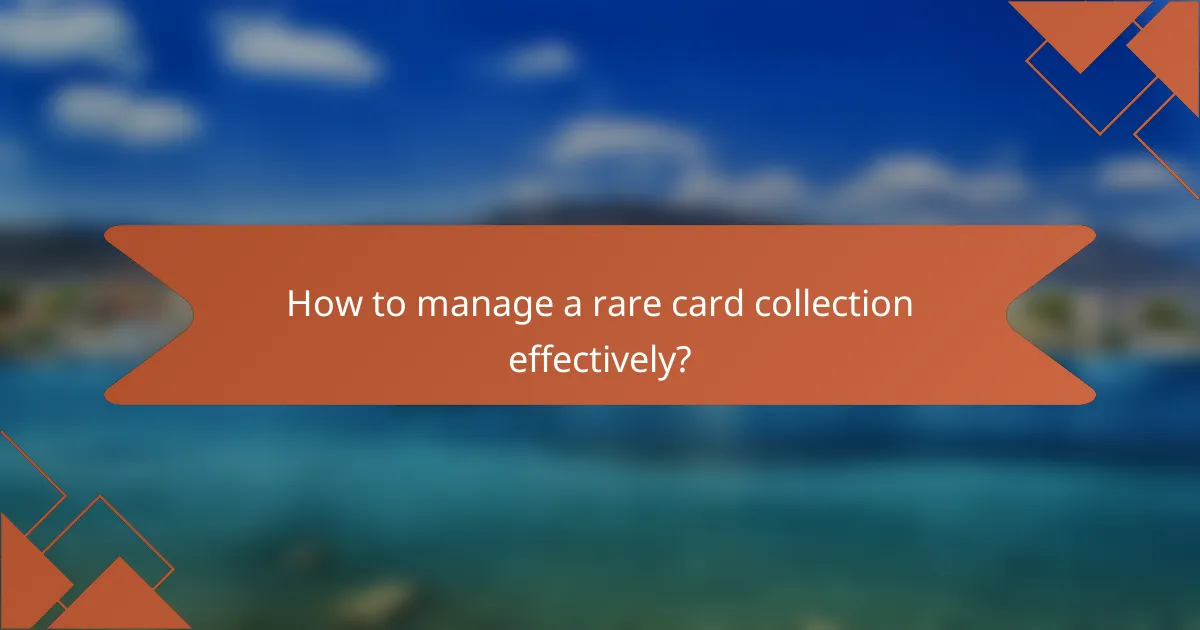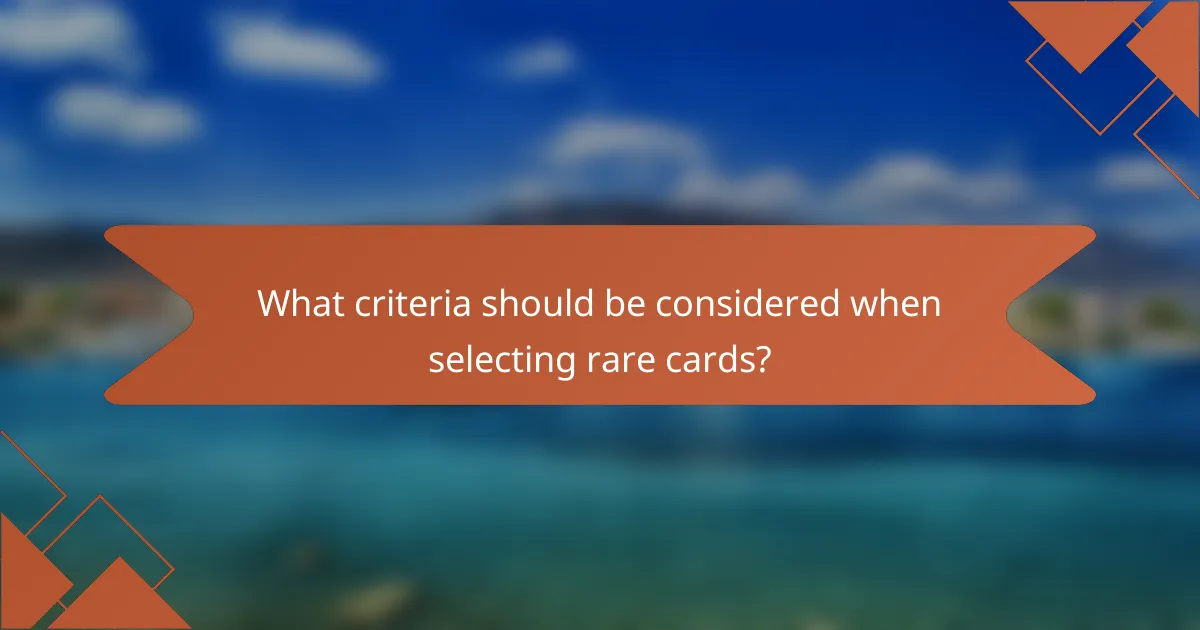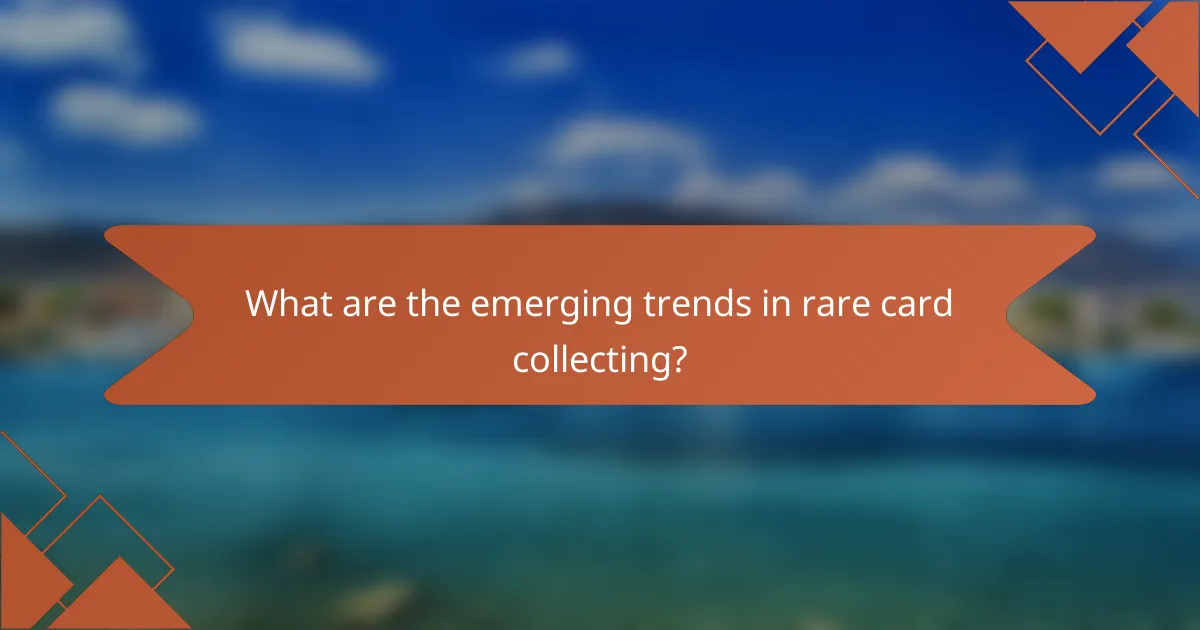Managing a rare card collection requires careful organization, protection, and regular valuation to enhance both enjoyment and financial returns. By conducting thorough market research and understanding the nuances of rarity and demand, collectors can make informed decisions that maximize their investment potential. Strategic selling, effective marketing, and networking within the collector community are essential for achieving the best possible returns on rare cards.

How to manage a rare card collection effectively?
Managing a rare card collection effectively involves organizing your cards, ensuring their protection, and regularly assessing their value. This approach maximizes both enjoyment and potential financial returns from your collection.
Inventory management software
Using inventory management software can streamline the organization of your rare card collection. These tools allow you to catalog cards by various attributes such as rarity, condition, and market value.
Popular options include Cardboard Gold, TCGPlayer, and Excel spreadsheets. Choose software that fits your needs, whether you prefer a simple interface or advanced features like market tracking.
Physical storage solutions
Proper physical storage is crucial for protecting rare cards from damage. Consider using protective sleeves, top loaders, or binders specifically designed for card storage.
Store your cards in a cool, dry place to prevent warping or fading. Avoid areas with high humidity or direct sunlight, which can degrade card quality over time.
Regular valuation assessments
Conducting regular valuation assessments helps you stay informed about the market value of your rare cards. This can involve checking online marketplaces, auction results, and price guides.
Consider assessing your collection every six months to a year, especially if you plan to sell or trade cards. This practice ensures you’re aware of any significant market shifts that could affect your collection’s worth.
Insurance options for rare cards
Insuring your rare card collection is a wise decision to protect against loss or damage. Look for specialized insurance policies that cover collectibles, as standard homeowners’ insurance may not provide adequate coverage.
When selecting an insurance provider, consider factors like coverage limits, premiums, and claims processes. Document your collection with photographs and appraisals to facilitate the insurance process.
Community engagement for updates
Engaging with the card-collecting community can provide valuable insights and updates on market trends. Join online forums, social media groups, or local clubs to connect with fellow collectors.
Participating in discussions and attending events can help you learn about new releases, valuation changes, and best practices for managing your collection. Networking can also lead to potential trades or sales opportunities.

What are the best practices for valuing rare cards?
Valuing rare cards involves a combination of market research, professional appraisals, condition grading, and understanding rarity and demand. By following these best practices, collectors can make informed decisions about their collections and maximize their investment potential.
Market research on recent sales
Conducting market research on recent sales is crucial for understanding the current value of rare cards. Check online marketplaces, auction results, and price guides to gather data on similar cards. This information can help you identify trends and set realistic expectations for your card’s worth.
Utilize platforms like eBay, TCGPlayer, or specialized auction houses to track sales data. Look for completed listings to see actual sale prices rather than just asking prices, which can be misleading.
Professional appraisal services
Engaging professional appraisal services can provide an expert evaluation of your rare cards. Certified appraisers have the knowledge and experience to assess the value based on various factors, including market conditions and card specifics. This can be particularly beneficial for high-value items or when considering insurance coverage.
When selecting an appraiser, ensure they are accredited by recognized organizations such as the American Society of Appraisers or the International Society of Appraisers. This adds credibility to the appraisal and can be useful for resale or insurance purposes.
Condition grading systems
Condition grading systems play a vital role in determining the value of rare cards. Cards are typically graded on a scale from 1 to 10, with higher grades indicating better condition. Familiarize yourself with grading standards from organizations like PSA or BGS to understand how condition impacts value.
Common grading criteria include centering, corners, edges, and surface quality. A card in near-mint condition can be worth significantly more than one with visible wear, so it’s essential to assess your cards accurately before valuing them.
Rarity and demand analysis
Rarity and demand are key factors in the valuation of rare cards. A card that is limited in production or part of a special set often commands higher prices due to its scarcity. Research the print runs and any special editions to gauge how rarity affects value.
Additionally, consider the current demand for specific cards or sets. Trends can shift based on player popularity, nostalgia, or market speculation. Keeping an eye on community discussions and social media can provide insights into which cards are currently sought after.

How to maximize the value of rare cards?
To maximize the value of rare cards, focus on strategic selling, timing, effective marketing, and building a network within the collector community. Each of these elements plays a crucial role in ensuring you get the best possible return on your investment.
Strategic selling platforms
Selecting the right selling platforms is essential for maximizing the value of rare cards. Popular options include eBay, specialized auction houses, and dedicated trading card marketplaces. Each platform has its own audience and fee structure, so consider where your card is likely to attract the most interest.
For example, eBay offers a vast reach but may charge higher fees, while niche marketplaces might have lower fees but a more targeted audience. Research and compare platforms to find the best fit for your specific cards.
Timing sales for market peaks
Timing your sales can significantly impact the value you receive for rare cards. Monitor market trends and be aware of seasonal peaks, such as major tournaments or releases that can drive demand. Selling during these high-demand periods can lead to better prices.
Use tools like price tracking websites or community forums to gauge when the market is at its peak. Avoid selling during off-peak times when interest wanes, as this can lead to lower offers.
Marketing through social media
Utilizing social media is a powerful way to market rare cards and reach potential buyers. Platforms like Instagram, Facebook, and Twitter allow you to showcase your collection and engage with fellow collectors. High-quality images and engaging posts can attract attention and generate interest.
Consider joining collector groups or forums on these platforms to share your cards and connect with interested buyers. Regularly updating your followers with new acquisitions or sales can keep your audience engaged and informed.
Networking with collectors
Building relationships with other collectors can enhance your ability to maximize card values. Attend local card shows, conventions, or online events to meet fellow enthusiasts and potential buyers. Networking can lead to valuable insights and opportunities for trades or sales.
Engage in discussions about market trends and card values with your network. This knowledge can help you make informed decisions about when and how to sell your cards for the best possible price.

What criteria should be considered when selecting rare cards?
When selecting rare cards, consider factors such as historical significance, condition and grading, and current market trends. These criteria will help you identify cards that not only hold value but also have the potential for appreciation over time.
Historical significance
Historical significance refers to the importance of a card within its context, such as its role in a particular game or its impact on the collecting community. Cards that commemorate key events, milestones, or notable players often carry higher value due to their rarity and relevance.
For example, a card that marks a championship win or features a legendary athlete can be more desirable. Researching the background of a card can provide insight into its significance and help you make informed purchasing decisions.
Condition and grading
The condition of a card is crucial in determining its value. Cards are typically graded on a scale from 1 to 10, with higher grades indicating better condition. Factors such as surface wear, corners, edges, and centering all play a role in the overall grade.
Investing in cards that are graded 8 or above is often recommended, as these tend to retain value better. Always check for professional grading services like PSA or BGS, as their certifications can enhance a card’s marketability.
Market trends and forecasts
Understanding market trends is essential for maximizing the value of rare cards. Keep an eye on auction results, sales data, and collector interest to gauge which cards are gaining popularity. Trends can shift based on factors like player performance, nostalgia, or cultural events.
For instance, cards of players who have recently retired or achieved significant milestones may see a spike in demand. Regularly following market reports and joining collector communities can help you stay informed and make strategic buying or selling decisions.

What are the emerging trends in rare card collecting?
Emerging trends in rare card collecting include the rise of digital trading cards and the use of blockchain for authentication. These trends are reshaping how collectors engage with their collections and assess value.
Digital trading cards
Digital trading cards have gained popularity due to their accessibility and the convenience of online platforms. Collectors can buy, sell, and trade cards without the limitations of physical storage and shipping. Popular platforms like NBA Top Shot and Sorare allow users to own unique digital assets that can appreciate in value.
When collecting digital cards, consider the rarity and demand of specific cards, as these factors significantly influence their market value. Engaging with online communities can provide insights into trends and help collectors make informed decisions.
Blockchain authentication
Blockchain technology is increasingly used for authenticating rare cards, ensuring their provenance and ownership history. This technology provides a secure and transparent way to verify the authenticity of both physical and digital cards, reducing the risk of counterfeits.
Collectors should look for platforms that utilize blockchain for verification, as this can enhance the value of their cards. Understanding how blockchain works can also help collectors navigate the market more effectively and make informed purchases.
